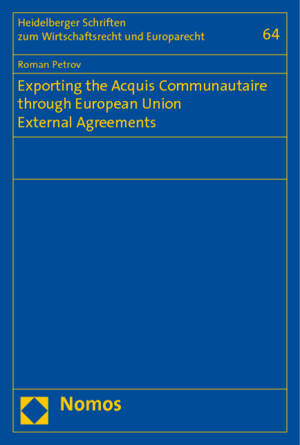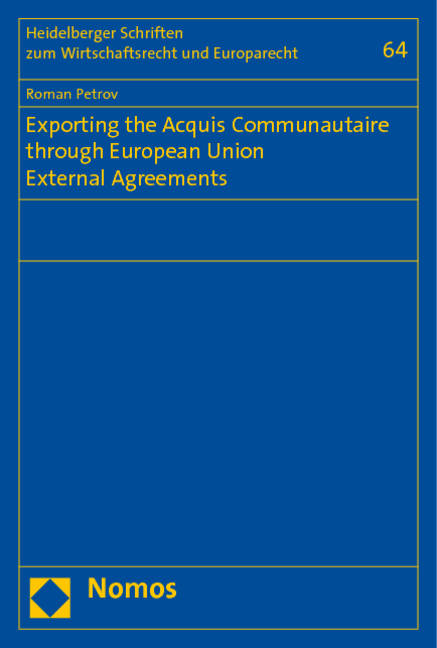
- Afhalen na 1 uur in een winkel met voorraad
- Gratis thuislevering in België vanaf € 30
- Ruim aanbod met 7 miljoen producten
- Afhalen na 1 uur in een winkel met voorraad
- Gratis thuislevering in België vanaf € 30
- Ruim aanbod met 7 miljoen producten
Zoeken
Exporting the Acquis Communautaire through European Union External Agreements
Roman Petrov
€ 79,95
+ 159 punten
Omschrijving
This book is a study of the legal dimensions of the concept of acquis communautaire . Using primary sources, it identifies and delimits the scope of the term in different contexts within EU legal discourse. The book starts by tracing the internal and external dimensions of acquis communautaire. These dimensions are distinguished by different objectives. The major objective of acquis communautaire in its internal dimension is to enable the consistent development of European Union (EU) law while preserving EU patrimony by Member States. The objective of the acquis communautaire application in its external dimension is twofold. First, it is to export the acquis communautaire overseas in order to push third countries at the forefront of the acquired level of economic, political and legal cooperation achieved by the EU. Second, it is to stimulate third countries to share European and international common democratic values and thereby to preserve integrity of the acquis communautaire in relations with third countries. It is argued that the acquis communautaire in its external dimension is not coherent, but mirrors the specific objectives of relation between the EU and third countries. In order to investigate the rationale behind this research hypothesis this work examines in detail the terms of a variety of EU external agreements from association to trade, development and co-operation. The book provides the reader with a more detailed insight into the linkage between the political environment, and the obligations undertaken in relation to the acquis communautaire by a third country in agreements with the EU. It is concluded that the acquis communautaire is a complex legal category of a dynamic nature. One must take into consideration the general objectives of EU external agreements, and the status of bilateral relations between the EU and third countries, in order to comprehend the fullest scope of the applicable acquis communautaire. Therefore, it could be argued that the acquis communautaire within EU external agreements as a dynamic category that directly depends not only on the explicit objectives of these agreements but also on the wider framework of relations between the parties and the general political climate of bilateral relations.
Specificaties
Betrokkenen
- Auteur(s):
- Uitgeverij:
Inhoud
- Aantal bladzijden:
- 313
- Taal:
- Engels
- Reeks:
- Reeksnummer:
- nr. 64
Eigenschappen
- Productcode (EAN):
- 9783832964344
- Uitvoering:
- Paperback
- Afmetingen:
- 153 mm x 227 mm
- Gewicht:
- 480 g

Alleen bij Standaard Boekhandel
+ 159 punten op je klantenkaart van Standaard Boekhandel
Beoordelingen
We publiceren alleen reviews die voldoen aan de voorwaarden voor reviews. Bekijk onze voorwaarden voor reviews.








